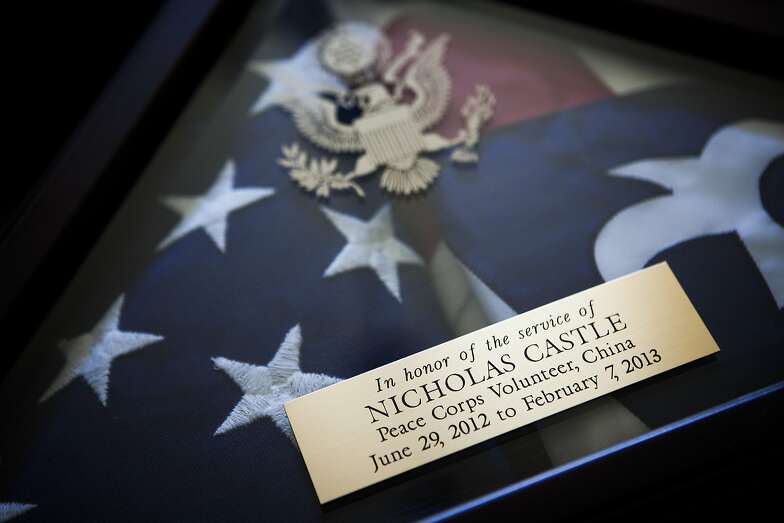Gordon Radley ( 1968-70) Op-Ed in San Francisco Chronicle
Peace Corps service is a risk worth taking
Gordon Radley
July 30, 2014 | Updated: July 30, 2014 10:57pm

Max Whittaker, New York Times
Nicholas Castle, a UC Berkeley graduate from Brentwood, was honored in April for his service as a volunteer in the Peace Corps in rural China, where he died from a sudden illness last year.
Peace Corps service is not without risk. I know that firsthand because my only brother was the first Peace Corps volunteer to die in service.
He was killed in an airplane crash in 1962 along with another volunteer and 36 Colombians on a remote mountaintop in the jungles of Colombia. His remains lie there today along with those of all of the other passengers. The death from a sudden illness last year of Nick Castle of Brentwood, a Peace Corps volunteer in rural China, reminds us that even after the service of nearly 215,000 Americans the risk in Peace Corps service never goes away. While Castle’s death has raised questions about the Peace Corps’ medical care, less than 0.2 percent of volunteers have died in service. In fact, the death rate for volunteers between the ages of 20 and 59 years is less than for Americans of the same age group living in the United States.
The Peace Corps is also an imperfect institution. I was a Peace Corps volunteer from 1968-70 and I am sure that aspect hasn’t changed since the late ’60s. Unfortunately, our Congress, the Catholic Church, the United Nations, our military, to name just a few, are also imperfect institutions. I expect we would all agree that no institution is perfect, yet those imperfections do not negate their purpose and mission.
The Peace Corps can be made better, it will be made better, and service in the Peace Corps remains as personally compelling and necessary to our country as ever. I would hope that the tragedy of Castle’s death does not dissuade any American from that point of view.
Peace Corps can be a formative training ground for success. Years after my service, I became president of Lucasfilm Ltd. Young people often would ask me how they could chart a similar course. My answer was: Join the Peace Corps.
To be successful in life is to learn how to be effective in imperfect environments – your high school, college, workplace, religious institution, community. The imperfections of such environments do not excuse effort but engage it. As a Peace Corps volunteer, you are continuously confronted with unforeseen challenges and institutions that seem resistant to change. Either you give up and use these circumstances as an excuse, or you engage these challenges with revised strategies and continue to reinvent how you do your job. As the Peace Corps says, “It is the toughest job you will ever love.”
Over its history, the Peace Corps has served in nearly 140 countries and today is in 65 nations in all parts of the world with more than 7,000 volunteers serving in education, health, economic development, agriculture and other developmental programs. Even more countries are requesting volunteer programs, but because of budgetary constraints Peace Corps cannot meet those needs.
Wherever Peace Corps exists, it is the Peace Corps volunteer who is America’s face to the world and often the only American the people will ever know. At a time when America’s outreach to the world most often seems to be the clenched fist, it is the Peace Corps that shows the world our outstretched hand.
A year after my brother was killed in the Peace Corps, my only sister volunteered to serve in the Peace Corps in Colombia as well. My parents often were challenged by their friends to justify sending their remaining children into the Peace Corps after it had taken their firstborn.
My parents’ response is best expressed by President John F. Kennedy, who, several months after my brother was killed, told Peace Corps staff: “There have been Peace Corpsmen who have died already in the service of their country and, in a larger sense, in the service of peace and the service of all people … and, I suppose that through the hazards of fate, living as these young men and women do on the horizon of experience, that others will find themselves giving up their lives. I can imagine, if that must come, no cause – the cause of peace – that is more worthy of that kind of contribution.”
I hope such words will bring solace to the parents of Nick Castle.
Gordon Radley was the president of Lucasfilm Ltd. from 1993 to 2003. He serves on the advisory council of the National Peace Corps Association.
No comments yet.
Add your comment